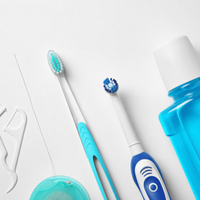
With many dental practices running a reduced service at the moment, dentists are urging patients to take good care of their teeth and gums. The Coronavirus lockdown has caused significant backlogs, and many dental teams are working to reorganise delayed and cancelled appointments before resuming routine services, such as check-ups. In the absence of the widespread availability of dental examinations, here are some self-help techniques you can utilise to keep your smile in check.
Oral hygiene
Good oral hygiene is the most effective way to keep dental disease at bay and reduce the risk of ailments and unpleasant symptoms such as toothache, bleeding gums and infections. Ideally, your daily oral hygiene regime should include twice-daily brushing using fluoride toothpaste and daily flossing or interdental brushing. Clean your teeth for at least two minutes each morning and evening, and try and avoid brushing within 45 minutes of eating or drinking. When you brush, apply toothpaste to the bristles and gently guide the brush around your teeth, angling the head to reach right into the corners and covering every surface of each individual tooth. Try and resist the temptation to brush hard. If you brush too firmly, this can damage the enamel. It’s also beneficial to avoid rinsing after brushing to prevent removing fluoride from the tooth surface. Interdental cleaning using a small hand-held brush or floss is important for targeting areas that cannot be reached with a toothbrush. After cleaning your teeth, brush your tongue with your toothbrush or use a tongue scraper. This will help to remove bacteria and food debris and lower the risk of bad breath (halitosis).
Diet
Your diet has an essential role to play if you’re on a mission to protect your teeth and gums. While many foods, for example, dairy products, nuts, seeds and leafy green vegetables, are good for your teeth because they contain calcium, some can be harmful. Foods that contain a lot of sugar and acidic foods and drinks carry a risk of decay and gum disease. As well as keeping an eye on what you eat, it’s critical to think about when you eat. This is because bacteria release acids when they feed. These acids attack and weaken the tooth enamel temporarily, and the teeth can only withstand a limited number of acid attacks. Aim to stick to three main meals and avoid grazing. If you snack all day, your enamel will not get chance to recover, and it may become worn and weak.
Dental care
It might not be possible to see a dentist every 6-12 months at the moment, but it’s vital to seek advice if you do have any concerns about your dental health. Contact your dentist if you have prolonged periods of toothache or severe pain, or you notice blood when you brush your teeth. Bleeding, sore and swollen gums are symptomatic of gum disease, while pain, fever, inflammation and tenderness can be linked to dental infections. Your dentist will be able to recommend pain relief options, and they can also book an appointment for you if you need immediate treatment.
Summary
There are several very simple steps you can take to improve your dental health and reduce the risk of oral health problems. Twice-daily brushing, eating well and seeking advice if you notice unusual symptoms will stand you in good stead to avoid dental dilemmas.










